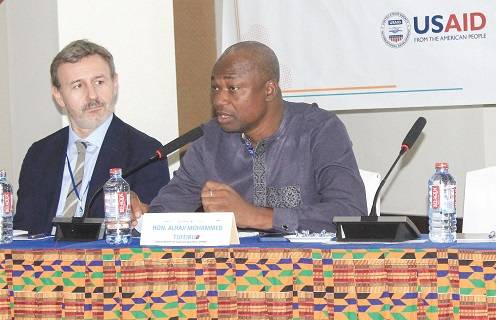According to Bryan Acheampong, minister of food and agriculture, farmer-led irrigation development is essential to maintaining irrigation systems in Africa, which are essential to a steady food supply.
He said that the government's construction of dams, especially in the north, was in keeping with this, providing water sources year-round for home consumption, cattle, and small-scale irrigation in smallholder communities.
This was said by the minister in an address that was read on his behalf during a two-day irrigation conference for Africa in Accra.
Participants in the conference from Africa's agriculture sector discussed and exchanged ideas about irrigation techniques.
Additionally, it aimed to foster collaboration, quicken processes, and support farmer-led irrigation development (FLID) for greater productivity in Africa.
Participants at a workshop organized by the International Water Management Institute (IWMI) discussed ways to overcome systemic challenges over the next five years by acquiring new knowledge and making investments.
The Innovation Lab for Small-Scale Irrigation (ILSSI), which receives funding from USAID, the CGIAR Initiative on West and Central African Food Systems Transformation, Water and Energy for Food, both CSOs, and the World Bank jointly sponsored the event with the topic "Sub-Saharan knowledge exchange conference."
Formation of awareness
In an effort to strengthen the nation's support for farmers, Mr. Acheampong promised that his organization would raise awareness of the importance of farmer-led irrigation.
"We are aware of the four routes that might be taken to further irrigation development in Africa." "The Ghana Irrigation Development Authority (GIDA) at the ministry is in charge of managing all irrigation systems in the country, including modest irrigation improvements driven by farmers," he stated.
Significance
Dr. Olufunke Cofie, the IWMI West Africa country representative, said that FLID might help smallholder farmers become more climatically resilient.
Given the numerous efforts in research implementation and investment across Africa, she claimed that it also transformed food systems.
Therefore, according to Dr. Cofie, it is crucial to bring stakeholders together so that implementers, investors, and researchers can share their lessons learned.
"We are assembling to exchange knowledge, best practices, and insights from interventions and research.
"We must not ignore this category of farmers who may require better technology, such as solar panels, to succeed," she continued.


